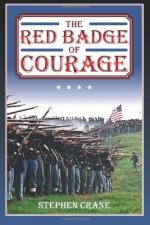|
|
The Red Badge of Courage Chapter 21
The field in front of the youth's regiment was now empty. They realized they were free, sighed collectively, then hurried nervously backward. The retreat was paradoxical - men who had stood steadfast in battle now showed their anxiety, perhaps dreading to be killed in insignificant ways. As they approached their own lines, an obviously veteran regiment shouted sarcastic comments at them. One man challenged the lounging veterans to fist fights, but the lieutenant restrained him. The youth felt stung by the remarks.
"From under his creased brows he glowered with hate at the mockers. He meditated on a few revenges. Still, many in the regiment hung their heads in criminal fashion, so that it came to pass that the men trudged with a certain heaviness, as if they bore upon their bended shoulders the coffin of their honor." Chapter 21, pg. 117
Topic Tracking: Peer Pressure/Morale 15
Turning to look at the field over which they had charged, the youth realized that the great distance he thought he had traveled was actually trivial, as was the time that had elapsed. The fact that there was perhaps some justification to the taunts of the veterans angered him. The youth, however, took satisfaction in the memory of his deeds. As he thought, the general who had branded the regiment as "mule drivers" rode up. He began to rage at colonel MacChesnay, who had led the charge, reproaching him for making a mess of things by stopping one hundred feet short of success. At the same time, he reproached the regiment's men for being poor fighters. The colonel acted injured, then shrugged and told the general they had gone as far as they could. The general departed in a rage.
The lieutenant then spoke up, saying that if the general thought the regiment fought poorly, he was a damned fool. News of the reproach went down the line, however, and weighed on the men like cuffed animals. Wilson was infuriated, but the youth rationally explained that the general had simply made an assumption on the regiment's fighting and jumped to a conclusion. They were debating, when a group of men came up and said excitedly that they had news. They said that they had overheard that colonel and the lieutenant talking; the colonel had wanted to know who the boy carrying the flag was. The lieutenant had replied that it was the youth, Henry Fleming, and that Wilson had been at his side at the head of the charge. The colonel had said confidently that Fleming and Wilson deserved to be major generals. The youth and Wilson called the men liars, but flushed with pride all the same. They quickly forgot all of their prior disappointments and felt nothing but affection for the colonel and the lieutenant.




